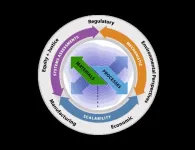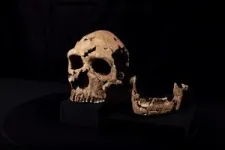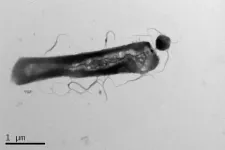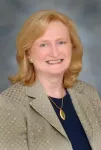(Press-News.org) Scientists at Oak Ridge National Laboratory and six other Department of Energy national laboratories have developed a United States-based perspective for achieving net-zero carbon emissions. The roadmap was recently published in the journal Nature Reviews Chemistry.
The researchers from the DOE laboratories — ORNL, Pacific Northwest National Laboratory, Brookhaven National Laboratory, Argonne National Laboratory, Lawrence Berkeley National Laboratory, Ames National Laboratory and SLAC National Accelerator Laboratory — pooled their diverse expertise to devise a roadmap to “defossilize” portions of the U.S. economy by reducing carbon emissions from segments of the market that are challenging to electrify. Their plan calls for using novel approaches to increase the repurposing of carbon that already exists, thereby closing the carbon cycle.
“The breadth of this research shows the benefit of collaboration across our national laboratories,” said ORNL Director Stephen Streiffer. “Carbon is a vital part of many of today’s products and processes, and we must be creative in how to address its use in the face of global climate change.”
Unlike decarbonization, which focuses on capturing or sequestering carbon emissions, defossilization involves slowing or stopping the demand for new fossil-fuel extraction. This could be achieved by recovering carbon from existing processes and products and, instead of setting it aside, reusing it where possible. This “circular economy” would reclaim much of the carbon that already exists in fossil-fueled power generation and difficult-to-use materials such as biomass, municipal waste, biomethane, carbon dioxide and plastics.
Defossilization could specifically help reduce new emissions from the transportation and industrial sectors that, together, account for more than 50% of the country’s carbon footprint. They also are the most difficult segments to transition from fossil fuels to electricity in a process called electrification. While industrial and scientific research continues to discover suitable clean technologies or materials substitutes, these and other vital parts of the economy will continue to require carbon to operate.
Michelle K. Kidder is a distinguished ORNL researcher and program manager for ORNL’s DOE Fossil Energy Carbon Management decarbonization portfolio. Her focus is on integration of novel material development for chemical reactions and separations at atomic-to-industrial process levels for sustainable and renewable clean energy technologies. She said achieving defossilization in difficult-to-electrify segments will require accelerating the pace of discovery for transformative technologies.
“Maintaining today’s 15- to 20-year discover-design-develop-deploy cycle will not allow us to slow, stop or even reverse climate impacts in time to meet aggressive 2030 and 2050 U.S. targets,” she said. “We must instead find new ways to approach fundamental advancements in science and more quickly translate discoveries into applications that can make significant impact on emissions reductions.”
To enable more widespread and affordable, equitable and inclusive defossilization, hundreds of scientists and technical experts from throughout the country’s national laboratory system are working to bridge historical scientific and technology barriers. Research at ORNL is focused on reducing the nation’s carbon footprint without burdening other resources, such as water or precious metals. For example, researchers are combining chemistry, artificial intelligence and machine learning to help predict properties for new materials and using ORNL’s Frontier — the world’s fastest supercomputer — to make high-performance computations as they engineer and model new energy technologies, including next-generation fusion and new fission nuclear reactors. While their research relies on science, it increasingly incorporates techno-economic and lifecycle analyses to help pinpoint potential environmental and social impact challenges of new technologies.
Kidder sees a compelling need to include such systemwide analyses that encompass technical, environmental, economic, political and social factors. “Even as we look for alternatives to reusing and keeping carbon in play, defossilization must allow equitable and ecological solutions for everyone,” she said. “If we can bring this vision to fruition at the urgent pace needed, we also can reduce carbon dioxide and its consequent impact on the environment while ensuring that no community is left behind.”
UT-Battelle manages ORNL for the Department of Energy’s Office of Science, the single largest supporter of basic research in the physical sciences in the United States. The Office of Science is working to address some of the most pressing challenges of our time. For more information, please visit energy.gov/science.
END
Researchers offer US roadmap to close the carbon cycle
2024-05-01
ELSE PRESS RELEASES FROM THIS DATE:
Precipitation may brighten Colorado River’s future
2024-05-01
The Colorado River’s future may be a little brighter than expected, according to a new modeling study from CIRES researchers. Warming temperatures, which deplete water in the river, have raised doubts the Colorado River could recover from a multi-decade drought. The new study fully accounts for both rising temperatures and precipitation in the Colorado’s headwaters, and finds precipitation, not temperature, will likely continue to dictate the flow of the river for the next 25 years.
Precipitation falling in the river’s headwaters region is likely to be more abundant ...
Identifying risks of human flea infestations in plague-endemic areas of Madagascar
2024-05-01
Madagascar is one of the last places where outbreaks of human bubonic plague still happen regularly.
Fleas carrying the plague bacterium Yersinia pestis can spread the disease through their bites. And while a species commonly known as “the rat flea” has been fingered as the main culprit in plague outbreaks, a species known as “the human flea” may play a secondary role.
As an investigator during plague outbreaks in rural Madagascar, medical entomologist Adelaide Miarinjara knew that many households were teeming with these human fleas. Miarinjara grew up in the ...
Archaea can be picky parasites
2024-05-01
A parasite that not only feeds of its host, but also makes the host change its own metabolism and thus biology. NIOZ microbiologists Su Ding and Joshua Hamm, Nicole Bale, Jaap Damsté and Anja Spang have shown this for the very first time in a specific group of parasitic microbes, so-called DPANN archea. Their study, published in Nature Communications, shows that these archaea are very ‘picky eaters’, which might drive their hosts to change the menu.
Archaea are a distinct group of microbes, similar to bacteria [see box]. The team of NIOZ microbiologists studies the so-called ...
EPA underestimates methane emissions from landfills, urban areas
2024-05-01
The Environmental Protection Agency (EPA) is underestimating methane emissions from landfills, urban areas and U.S. states, according to a new study led by researchers at the Harvard John A. Paulson School of Engineering and Applied Sciences (SEAS).
The researchers combined 2019 satellite observations with an atmospheric transport model to generate a high-resolution map of methane emissions, which was then compared to EPA estimates from the same year. The researchers found:
Methane emissions from landfills are 51% higher compared to EPA estimates
Methane emissions from 95 urban areas are 39% higher than EPA estimates
Methane emissions ...
Feathers, cognition and global consumerism in colonial Amazonia
2024-05-01
Amazonia is the home of the largest variety of birds in the world. In such a unique environment, craft cultures have flourished by translating the beauty and creativity of environmental materials like feathers into stunning pieces of art. “The Material Creativity of Affective Artifacts in the Dutch Colonial World,” a new article in Current Anthropology by Stefan Hanß of the University of Manchester, examines artisanal featherwork within the context of early modern colonialism ...
Satellite images of plants’ fluorescence can predict crop yields
2024-05-01
ITHACA, N.Y. – Cornell University researchers and collaborators have developed a new framework that allows scientists to predict crop yield without the need for enormous amounts of high-quality data – which is often scarce in developing countries, especially those facing heightened food insecurity and climate risk.
In many parts of the world, crop yields are dropping, largely due to the effects of climate change. According to a recent Cornell study, over the last four decades, for every 1 degree Celsius of warming, net farm income decreased by 66%.
Farmers in developed countries can often rely on big datasets ...
Machine learning tool identifies rare, undiagnosed immune disorders through patients’ electronic health records
2024-05-01
Researchers say a machine learning tool can identify many patients with rare, undiagnosed diseases years earlier, potentially improving outcomes and reducing cost and morbidity. The findings, led by researchers at UCLA Health, are described in Science Translational Medicine.
“Patients who have rare diseases may face prolonged delays in diagnosis and treatment, resulting in unnecessary testing, progressive illness, psychological stresses, and financial burdens,” said Manish Butte, MD, PhD, a UCLA professor in pediatrics, human genetics, and microbiology/immunology who cares for these patients in his clinic at UCLA. “Machine learning and other artificial intelligence ...
MD Anderson researcher Sharon Dent elected to prestigious National Academy of Sciences
2024-05-01
HOUSTON ― Sharon Dent, Ph.D., professor of Epigenetics and Molecular Carcinogenesis at The University of Texas MD Anderson Cancer Center, has been elected to the National Academy of Sciences (NAS). Dent is a global leader in the field of chromatin research whose foundational work has helped define the role of chromatin in cancer growth and development.
Dent is one of 120 members and 24 international members elected this year in recognition of their distinguished and continuing achievements in original research. The NAS, established in 1863 by President Abraham Lincoln, is a private, nonprofit society of distinguished scholars engaged in scientific and engineering research.
With ...
Nonmotor seizures may be missed in children, teens
2024-05-01
EMBARGOED FOR RELEASE UNTIL 4 P.M. ET, WEDNESDAY, MAY 1, 2024
MINNEAPOLIS – Children and teens may experience nonmotor seizures for months or years before being seen in an emergency department for a more obvious seizure that includes convulsions, according to a study published in the May 1, 2024, online issue of Neurology®, the medical journal of the American Academy of Neurology. Even then, the history of nonmotor seizures may not be recognized.
“Early diagnosis of epilepsy is of the utmost importance because epileptic seizures can lead to injury and even death,” said study author Jacqueline French, MD, of NYU Grossman School of Medicine ...
Emergency departments frequently miss signs of epilepsy in children
2024-05-01
A subtle type of seizure goes undetected two thirds of the time in pediatric emergency departments, a new study shows.
The work focuses on “nonmotor” seizures, which cause children to “zone out” and stare into space or fidget. They may also feel sudden changes in emotions, thoughts, or sensations, as opposed to motor seizures, which cause muscles to move in abrupt, jerking motions.
According to the authors, improving recognition of nonmotor seizures may speed up the diagnosis and treatment of epilepsy in children, ...





